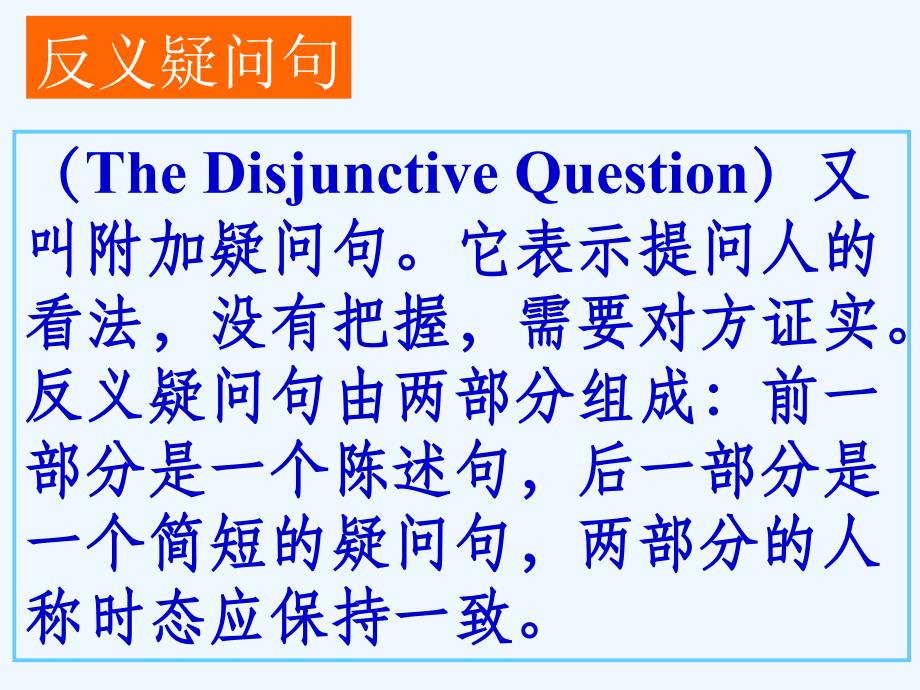 反义疑问句课件
反义疑问句课件



《反义疑问句课件》由会员分享,可在线阅读,更多相关《反义疑问句课件(41页珍藏版)》请在装配图网上搜索。
1、(The Disjunctive Question)又)又叫附加疑问句。它表示提问人的叫附加疑问句。它表示提问人的看法,没有把握,需要对方证实。看法,没有把握,需要对方证实。反义疑问句由两部分组成:前一反义疑问句由两部分组成:前一部分是一个陈述句,后一部分是部分是一个陈述句,后一部分是一个简短的疑问句,两部分的人一个简短的疑问句,两部分的人称时态应保持一致。称时态应保持一致。反义疑问句Its cold,_?isnt itYes,it is.They are playing football,?arent theyYes,they are.They dont like swimming,_?do
2、 theyYes,they do.They like it a lot.Lily was ill in bed,_?Yes,she was.wasnt sheShe wasnt at home,_?was sheNo,she wasnt.The students were in the classroom,_?Yes,they were.werent theyThey werent in the zoo last Sunday,_?No,they werent.They went to the mountains.were theyIt rained heavily yesterday,_?d
3、idnt itYes,it did.Liu Xiang won the hurdle race again,_?Yes,he did.didnt heThere was a heavy snow last year,_?Yes,there was.wasnt there反意疑问句反意疑问句/附加疑问句附加疑问句-陈述句陈述句+附加问句附加问句 规则:规则:1.前肯,后否;前肯,后否;2.前否,后肯;前否,后肯;3.附加问句和陈述句人称、时态一附加问句和陈述句人称、时态一致(相应时态的致(相应时态的助动词助动词的肯定的肯定/否否定形式定形式+人称代词)。人称代词)。1.前肯,前肯,+后否后否 b
4、 be 动词:动词:1.You are an actor,_ _?2.He is a good boy,_ _?3.It was fine yesterday,_ _?4.You were studying when I called you last night,_ _?5.She is going to visit me,_ _?6.I am Chinese,_ _?arent you isnt he wasnt it werent you isnt she arent I行为动词:行为动词:1.It often rains here,_ _?2.He likes soccer,_ _?3
5、.You have a headache,_ _?4.I called you yesterday,_ _?其它动词:其它动词:1.You will go to America,_ _?2.We have ever been to Shanghai,_ _?doesnt it doesnt he dont you didnt I wont youhavent we 2.前否,前否,+后肯后肯 1.You arent an actor,_ _?2.He isnt a good boy,_ _?3.It wasnt fine yesterday,_ _?4.It doesnt rain here,
6、_ _?5.His sister doesnt have a headache,_ _?6.You didnt call me yesterday,_ _?are you is hedoes itdoes she was itdid you7.You wont go to U.S.A.,_ _?8.There isnt a boy in our classroom,_ _?9.There werent many cars in the street,_ _?10.Dont smoke,_ _?11.Lets do it,_ _?will youis therewere therewill yo
7、ushall we特殊用法特殊用法1-祈使句的反意疑问句:祈使句的反意疑问句:在在祈祈使使句句后后面面附附加加问问句句,以以加加强强语语气气或或使使祈祈使使句句听听起起来来较较委委婉婉、客客气气。附附加加问问句句可可选选用用“will you?”“wont you?”。祈祈使使句句为为否否定定结结构构时时,附附加加问问句句一一般般只只用用“will you?”.陈陈述述句句为为“Lets”结结构构时时,表表示示建建议议,其其意意思思包包括括对对方方,即即“让让我我们们(你你我我双双方方)”附附加加问问句一般用句一般用“shall we?”。陈陈述述句句为为“Let us”结结构构时时,表表示示
8、请请求求,其其意意思思不不包包括括对对方方,即即“你你让让我我们们(You let us)”,附加问句一般用附加问句一般用 “will you?”-祈使句祈使句1.Sit down please,_?2.Please call me,_?3.Lets go home,_?4.Let us go home,_?5.Dont leave now,_?will/wont youshall we will/wont you will youwill/wont you特殊用法特殊用法2 情态动词的反义疑问句情态动词的反义疑问句 陈述句陈述句+情态动词的简短否定情态动词的简短否定/肯定肯定+主语主语?1)
9、He can play the piano,_?2)He should go right now,_?3)They cant finish it,_?cant heshouldnt hecan they带情态动词带情态动词dare或或need的反意的反意疑问句,疑问部分常用疑问句,疑问部分常用 need(dare)+主语。主语。We need not do it again,need we?He dare not say so,dare you?当当dare,need 为实义动词时,为实义动词时,疑问部分用助动词疑问部分用助动词 do+主语。主语。She doesnt dare to go h
10、ome alone,does she?He ought to know what to do,oughtnt he?/shouldnt he?含有含有ought to 的反意疑问句,陈述部分是肯定的反意疑问句,陈述部分是肯定的,疑问部分用的,疑问部分用shouldnt/oughtnt+主语。主语。特殊用法特殊用法3-There be句型的反意疑问句句型的反意疑问句。陈述句为陈述句为There be结构时,附加问句仍用结构时,附加问句仍用there。1.There is a famous doctor in your hometown,_?Yes,there is.2.There are man
11、y visitors in Beijing now,_?3.There will not be any classes tomorrow,_?No,there wont.4.There wasnt anything new on TV last night,_?Yes,there was a new TV play.It was very interesting.isnt therearent therewill therewas there特殊用法特殊用法4 4陈陈述述部部分分如如果果有有否否定定意意义义的的词词,如如:hardly(几几乎乎不不),never(从从不不),nothing,f
12、ew,little,no,seldom(很很少少),tooto(太太以以至至于于不不能能)等等,这这时时疑疑问问部部分分要要用用肯肯定定形式。形式。1.Mr.Smith can hardly speak Chinese,_?2.She has never been to Hong Kong,_?3.There is nothing important in the newspaper,_?4.Few people eat wild animals now,_?5.He knows little German,_?6.You have seldom met him recently,_?7.He
13、 is too young to join the army,_?has sheis theredo theydoes hehave youis he can he特殊用法特殊用法5 5回答反意疑问句的问题时,要注意根据事情情况回答.只要事实是肯定的,就用Yes回答,如果事实是否定的,就用No回答,不管第一部分句子是肯定或否定。Yes/No 和之后的简略回答必须一致。(注意中文和英文思维的差异)1.The book isnt so boring,is it?_.Its the worst book I have ever read._.Its fun,I think.2.You havent
14、been to the U.S.,have you?_.I want to have a visit one day._.I have been there three times.Yes,it is.No,it isnt.No,I havent.Yes,I have.特殊用法特殊用法6 6主主语语是是everyone,someone,anyone,no one,nobody等等不不定代词时,反意疑问句的主语一般用定代词时,反意疑问句的主语一般用they指代。指代。1.Everyone in your family is fond of swimming,arent they?你们全家都喜欢游
15、泳,是吗?你们全家都喜欢游泳,是吗?2.Anyone can do that,_?3.Someone is knocking at the door,_?4.No one knows about it,_?cant theyarent theydont they特殊用法特殊用法7 7主主语语是是everything,something,anything,nothing等等不不定定代词时,反意疑问句的主语一般用代词时,反意疑问句的主语一般用it指代。指代。1.Nothing is important for him,is it?2.Something is wrong with your com
16、puter,_?3.Everything is ready for the test,_?一切都准备好了,对吗?一切都准备好了,对吗?isnt itisnt it陈述部分的主语是陈述部分的主语是I,疑问部分要用,疑问部分要用 arent I.Im as tall as your sister,arent I?I am a student,arent I特殊用法特殊用法82)陈述部分的谓语是陈述部分的谓语是wish,疑问部分要用,疑问部分要用may+主语主语 I wish to have a word with you,may I?特殊用法特殊用法9陈述部分有陈述部分有 have to+v.(h
17、ad to+v.),疑问部,疑问部分常用分常用dont+主语(主语(didnt+主语)。主语)。We have to get there at eight tomorrow,dont we?They had to cross the busy street,didnt they?特殊用法特殊用法10陈述部分的谓语是陈述部分的谓语是used to 时,疑问部分用时,疑问部分用didnt+主语或主语或 usednt+主语。主语。He used to take pictures there,didnt he?She used to stay up late,usednt she?特殊用法特殊用法11
18、陈述部分有陈述部分有had better+v.疑疑问句部分用问句部分用hadnt you?Youd better read it by yourself,hadnt you?Youd better get up early,hadnt you?特殊用法特殊用法12陈述部分有陈述部分有would rather+v.疑问部分多用疑问部分多用 wouldnt+主语。主语。He would rather read it ten times than recite it,wouldnt he?特殊用法特殊用法13陈述部分有陈述部分有Youd like to+v.疑问部分用疑问部分用wouldnt+主语主
19、语。Youd like to go with me,wouldnt you?特殊用法特殊用法14must在表示在表示推测推测时,根据其推测的情况来确定反时,根据其推测的情况来确定反意疑问句。意疑问句。He must be a doctor,isnt he?You must have studied English for three years,havent you?He must have finished it yesterday,didnt he?It must be going to rain tomorrow,wont it?特殊用法特殊用法15感叹句中,疑问部分用感叹句中,疑问部分
20、用 be+主语。主语。What colours,arent they?What a smell,isnt it?特殊用法特殊用法16陈述部分由陈述部分由neither nor,either or 连接的连接的并列主语时,疑问部分根据其实际逻辑意义而并列主语时,疑问部分根据其实际逻辑意义而定。定。Neither you nor I am engineer,are we?Either you or he is right,_?,isnt he?特殊用法特殊用法17陈述部分为主语从句或并列复合句,疑问部分有陈述部分为主语从句或并列复合句,疑问部分有三种情况:三种情况:a.并列复合句疑问部分,谓语动词
21、根据邻近从句的谓语而定。As Mr.Smith had been to Beijing for several times,he should have been in China now,shouldnt he?特殊用法特殊用法18b.带有定语从句,宾语从句的主从复合句,疑问部分谓语根据主句的谓语而定:He is not the man who gave us a talk,is he?He said he wanted to visit Japan,didnt he?c.上述部分主句谓语是上述部分主句谓语是I;we think,believe,expect,suppose,imagine 等引导的宾语从句,疑等引导的宾语从句,疑问部分与宾语从句相对应构成反意疑问句。问部分与宾语从句相对应构成反意疑问句。I dont think he is bright,is he?We believe she can do it better,cant she?否定前缀不能视为否定词,其否定前缀不能视为否定词,其反意疑问句仍用否定形式。反意疑问句仍用否定形式。It is impossible,isnt it?He is not unkind to his classmates,is he?特殊用法特殊用法19
- 温馨提示:
1: 本站所有资源如无特殊说明,都需要本地电脑安装OFFICE2007和PDF阅读器。图纸软件为CAD,CAXA,PROE,UG,SolidWorks等.压缩文件请下载最新的WinRAR软件解压。
2: 本站的文档不包含任何第三方提供的附件图纸等,如果需要附件,请联系上传者。文件的所有权益归上传用户所有。
3.本站RAR压缩包中若带图纸,网页内容里面会有图纸预览,若没有图纸预览就没有图纸。
4. 未经权益所有人同意不得将文件中的内容挪作商业或盈利用途。
5. 装配图网仅提供信息存储空间,仅对用户上传内容的表现方式做保护处理,对用户上传分享的文档内容本身不做任何修改或编辑,并不能对任何下载内容负责。
6. 下载文件中如有侵权或不适当内容,请与我们联系,我们立即纠正。
7. 本站不保证下载资源的准确性、安全性和完整性, 同时也不承担用户因使用这些下载资源对自己和他人造成任何形式的伤害或损失。
最新文档
- 化工过程开发导论教学课件
- PXGL05SSGF下的运营管理课件
- (部编版教材)三年级上册《金色的草地》经典ppt课件
- 第二课-展示自己的职业风采课件
- (新课标)高三化学一轮总复习第6章化学反应与能量变化同步测试卷ppt课件
- (新课标)高考数学大一轮复习第一章集合与常用逻辑用语1.1集合ppt课件文
- 第五讲法家思想现代解读课件
- 第二章-人工晶体的生长2122课件
- 第三章学前儿童身体保健教育分析课件
- (部编版)祖父的园子优秀ppt课件
- 第七章老年心理学-课件
- 趣味竞赛—成语猜猜看82张课件
- 化工过程开发与设计-绪论-第1章课件
- 路基路面弯沉试验(贝克曼梁)课件
- (部编版)小学语文一级上册《项链》教学ppt课件
